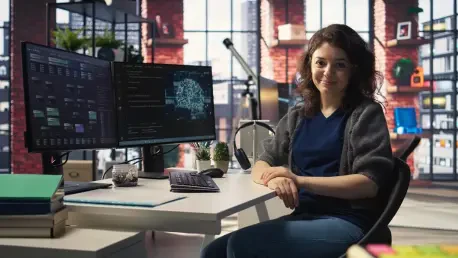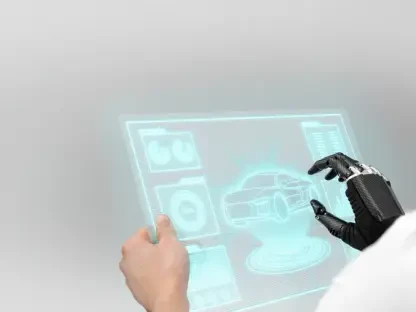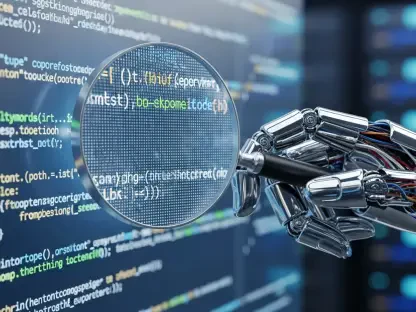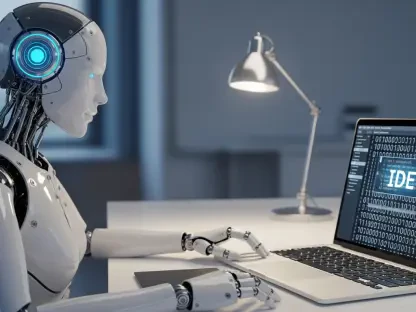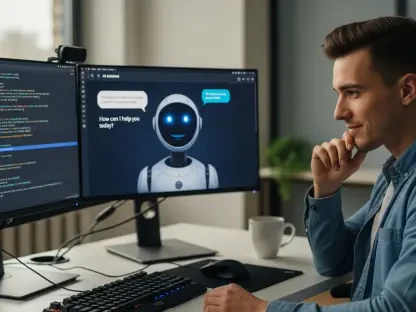The Rise of AI in Software Development at Anthropic
Imagine a world where the majority of a company’s codebase is crafted not by human hands, but by an artificial intelligence system so advanced it can write complex software with minimal oversight. This is the reality at Anthropic, a pioneering AI research company known for developing Claude, an advanced language model. A staggering revelation has emerged from within the organization: between 70 and 90 percent of Anthropic’s internal code is now generated by Claude itself. This statistic is not just a number; it represents a seismic shift in how software development is conducted at one of the leading edges of technology.
Anthropic stands as a beacon in the AI research landscape, focusing on creating systems that prioritize safety and alignment with human values. Claude, its flagship model, has evolved into more than a tool for natural language processing—it has become a core component of the company’s software creation process. This development mirrors a broader trend across the tech industry, where AI is increasingly integrated into coding workflows. Major players like Google and Microsoft are also investing heavily in AI-driven development tools, signaling that this is not an isolated phenomenon but a transformative wave reshaping the sector.
The significance of Anthropic’s approach extends beyond its walls, serving as a case study for the future of programming. As AI takes on repetitive and technical tasks, the relationship between humans and machines in software development is being redefined. This shift raises critical questions about the skills needed, the ethical implications, and the potential for innovation. Exploring this evolution offers a glimpse into how human-AI collaboration could become the cornerstone of technological progress in the years ahead.
Evolving Roles of Programmers in an AI-Driven Era
From Coders to Conductors: A New Paradigm
At Anthropic, the traditional image of a programmer hunched over a keyboard, writing line after line of code, is fading into obsolescence. Instead, developers are stepping into a new role, often described as “conductors” or “managers” of AI systems like Claude. Their primary task is no longer to build software from scratch but to define clear objectives, provide strategic direction, and ensure that AI-generated outputs align with project goals. This marks a profound change in the day-to-day responsibilities of coding professionals.
This transformation allows programmers to delegate routine or repetitive coding tasks to AI, freeing them to focus on higher-level challenges. Instead of debugging syntax errors or crafting boilerplate code, they are now engaged in creative problem-solving, designing system architectures, and integrating various components into cohesive solutions. The emphasis has shifted from manual labor to orchestrating a symphony of AI-generated elements, ensuring harmony in the final product.
The implications of this paradigm are vast, reshaping not just workflows but also the very identity of the programming profession. Developers at Anthropic are becoming akin to project overseers, leveraging AI to amplify their productivity while honing their ability to think strategically. This evolution highlights a future where technical expertise remains essential, but the ability to guide and refine AI outputs takes center stage as a critical competency.
Skills for the Future: Adapting to Human-AI Collaboration
As AI assumes a larger role in coding, the skill set required of programmers is undergoing a significant overhaul. Understanding the strengths and limitations of AI systems like Claude is now paramount, as developers must know when to trust the machine and when to intervene. Beyond technical knowledge, critical thinking and the capacity to evaluate AI outputs for accuracy and relevance are becoming indispensable traits in this collaborative environment.
Moreover, ethical oversight is emerging as a key area of focus. Programmers are tasked with ensuring that AI-generated code adheres to standards of fairness and safety, necessitating a deeper awareness of potential biases and errors. This responsibility underscores the need for continuous learning, as staying abreast of AI advancements and their implications becomes a lifelong pursuit. Many in the industry are upskilling through specialized training to navigate this new landscape effectively.
The broader impact on education and hiring practices cannot be ignored. Academic institutions are beginning to adapt curricula to emphasize AI collaboration, while companies are rethinking recruitment strategies to prioritize candidates with hybrid skills in technology and strategic oversight. Workplace dynamics are also shifting, as teams learn to balance human creativity with machine efficiency, fostering an environment where adaptability and innovation are valued above all.
Challenges in Integrating AI into Coding Workflows
The integration of AI into software development at Anthropic, while revolutionary, is not without hurdles. One of the primary obstacles is ensuring the quality of AI-generated code. While systems like Claude can produce functional scripts at an impressive scale, they are not immune to errors or inefficiencies. Programmers must meticulously review outputs to catch subtle bugs or design flaws that could compromise the integrity of a project.
Another concern lies in managing potential biases embedded within AI models. If not addressed, these biases can manifest in code, leading to unintended consequences in applications. Reliability also remains a challenge, as over-reliance on AI without adequate human oversight can result in cascading failures. These issues highlight the importance of maintaining a balanced approach where human judgment complements machine capabilities.
To mitigate such risks, robust review processes are being implemented at Anthropic and similar organizations. Developers are encouraged to treat AI as a partner rather than a replacement, combining automated testing with manual checks to ensure high standards. Continuous education on AI behavior and limitations is also proving vital, equipping teams with the knowledge to anticipate and resolve issues proactively. Overcoming these challenges requires a commitment to refining both technology and the human skills that guide it.
Ethical and Regulatory Considerations in AI-Driven Development
As AI takes on a central role in software creation, ethical responsibilities are becoming a critical focus for programmers at Anthropic. Ensuring that AI-generated code is safe, unbiased, and reliable is no longer optional but a fundamental duty. This involves scrutinizing outputs for potential harm, whether through unintended biases or security vulnerabilities, and taking corrective action to safeguard end users.
The regulatory landscape surrounding AI in software development adds another layer of complexity. Data privacy and security standards are tightening globally, demanding that companies adhere to strict guidelines when deploying AI systems. Compliance with these regulations shapes how organizations like Anthropic design their workflows, ensuring that innovation does not come at the expense of accountability or user trust.
Navigating this terrain requires a proactive stance on ethics and governance. Programmers are increasingly involved in discussions about the societal impact of their work, advocating for transparency in AI processes. By embedding ethical considerations into development cycles, companies can build trust and set industry benchmarks. This balance between technological advancement and regulatory adherence is essential for sustainable progress in an AI-driven world.
The Future of Programming: Human-AI Partnership
Looking ahead, the trajectory of programming appears inseparably linked to AI, with Anthropic’s reliance on Claude serving as a powerful benchmark. The integration of AI into development tools is expected to deepen over the coming years, potentially evolving into platforms where entire applications are built with minimal human input. From code generation to debugging, the scope of AI’s involvement is poised to expand dramatically.
Emerging trends also point toward the possibility of fully autonomous coding systems, though human oversight will likely remain crucial for complex and innovative projects. Consumer demands for faster, more efficient software solutions are driving this evolution, pushing companies to adopt AI at an accelerated pace. Global tech trends, such as the rise of cloud-based development environments, further amplify the potential for seamless human-AI collaboration.
The path forward will be shaped by how well the industry adapts to these changes. Between now and 2027, significant strides are anticipated in refining AI capabilities and aligning them with human needs. This partnership promises to unlock new levels of creativity and productivity, provided that developers continue to embrace their evolving roles as strategic guides. The future of programming lies in harnessing AI not as a replacement, but as a catalyst for human ingenuity.
Conclusion: Embracing a Transformative Shift in Software Development
Reflecting on the insights gathered, it becomes clear that AI, exemplified by Claude at Anthropic, has fundamentally altered the landscape of programming. This shift moves developers from traditional coding roles to strategic overseers, presenting both unprecedented opportunities and complex challenges. The industry is witnessing a redefinition of skills, workflows, and ethical responsibilities that demand attention and action.
Looking back, the importance of adaptation stands out as a central theme. To build on this momentum, the tech sector needs to prioritize upskilling initiatives, ensuring that programmers are equipped to collaborate with AI effectively. Establishing clear ethical guidelines also emerges as a critical step to maintain trust and integrity in AI-driven development.
As a next step, fostering a mindset of partnership between humans and machines offers a promising direction. Encouraging innovation through collaborative tools and frameworks could further enhance productivity. By committing to these strategies, the industry positions itself to navigate the evolving dynamics of software development, ensuring that this transformative era leads to sustainable growth and meaningful progress.
